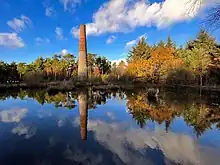
The Chimney showing its information board

Autumn colours around the Chimney and pond
Smitham Chimney is a chimney which was used for lead mining just outside the village of East Harptree, in the parish of Priddy, Somerset, England. It is a Grade II listed building.[1]
The circular chimney has two types of red brick in its upper portion. There is a narrow opening at the base of the chimney.[2]
It was built by the 'East Harptree Lead Works Co Ltd' in 1867,[3] and by 1870 was producing 1,000 tons per annum.[4] The company was largely unsuccessful and the industry only lasted for a few years.[5] The chimney was threatened to be demolished in 1973, by the Somerset County Council but was protected from demolition.[6][7] Because of the pollution the site supports a population of lead moss (Ditrichum plumbicola).[8]
References
- ↑ "Chimney at Former Lead Works on Smitham Hill, Priddy". British Listed Buildings. Retrieved 28 August 2011.
- ↑ "Chimney at NGR ST 5542 5461, Smitham Hill". Somerset Historic Environment Record. Somerset County Council. Retrieved 28 August 2011.
- ↑ "Harptree and Smitham Hill". British Geological Survey. Retrieved 28 August 2011.
- ↑ "Mendip Lead Mining 1600 – 1900" (PDF). Your Paulton. Retrieved 28 August 2011.
- ↑ Gough, J.W. (1967). The mines of Mendip. Newton Abbot: David & Charles.
- ↑ "East Harptree". Forestry Commission. Retrieved 28 August 2011.
- ↑ Vallins, John (16 June 2009). "Somerset". The Guardian. Retrieved 28 August 2011.
- ↑ Rumsey, Fred; Crouch, Helena (October 2010). "Ditrichum plumbicola Crundw. (lead-moss) in the Mendips" (PDF). Field Bryology (102): 3–9.
This article is issued from Wikipedia. The text is licensed under Creative Commons - Attribution - Sharealike. Additional terms may apply for the media files.